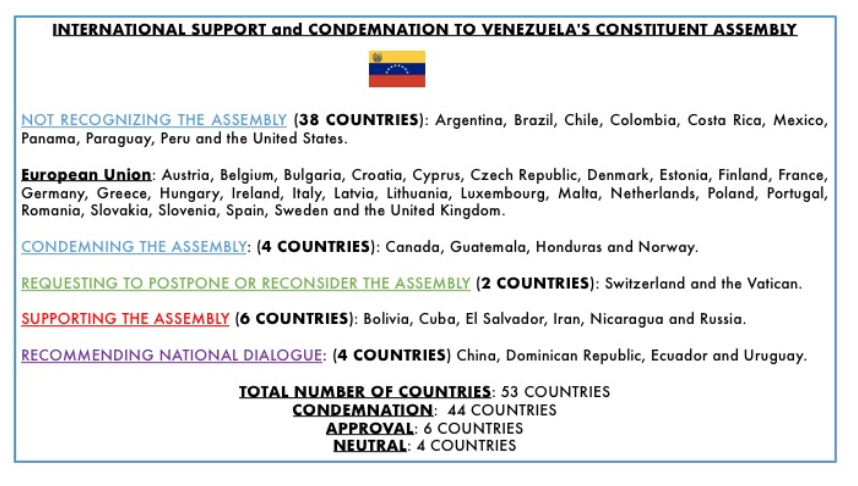The election undertaken by the Venezuelan government to impose a fraudulent Constituent Assembly has drawn a broad international response.
The reactions, mostly by countries of the Western Hemisphere and Europe, can be divided into five categories. First, countries not recognizing the Assembly. Second, those only condemning it. Third, countries which requested the election of the Assembly be postponed or not celebrated. Fourth, countries supporting the Constituent Assembly and fifth, countries avoiding any specific qualification of the Assembly but reiterating that a dialogue should take place to solve the crisis.
The 38 countries (10 from the Western Hemisphere and the 28 Member States of the EU) not recognizing the Assembly, most likely will be the more active in exerting pressure. The options are two-fold: diplomatic actions and sanctions. The diplomatic measures could include a withdrawal of ambassadors (or other high-ranking officials) from Venezuela, a partial or total cut of diplomatic ties, the expulsion of Venezuelan diplomats from their respective countries or setting a more favorable scenario for an internationally-supervised negotiation. Sanctions could be toward members of the Maduro regime, representatives of the Assembly and their associates or relatives. For now, the United States has led the way on the sanctions front, but that seems to be changing as some Latin American countries like Colombia and Mexico have announced that they will replicate US sanctions towards Venezuela. The EU is already considering punishing certain Venezuelan officials with an entry ban as per Spain’s suggestion.
On the other hand, economic sanctions appear to be an option for the US, but for now less likely to be imposed by the EU and Latin America. Obviously, they could have an enormous impact on the Venezuelan economy – which is already in shambles – especially if one considers that of the 38 countries not recognizing the Assembly, 10 are among Venezuela’s 16 top trading partners. It is not yet clear if these countries would in fact restrict trade with Venezuela if the Constituent Assembly keeps moving forward, and especially if it designates a new government and dissolves the opposition-led National Assembly and imprisons the now more independent Attorney General.
Countries that are condemning the Assembly – like Canada, Guatemala, and Honduras – could soon be joining the camp of countries not willing to recognize the Maduro’s regime fraudulent experiment. Their cautious first reaction of merely reproving the initiative leaves all the options available, but experience suggests that these countries usually accompany the decisions of the group of countries that have already decided to disavow the regime’s wild card.
For the time being, only six countries have explicitly supported the Constituent Assembly. Bolivia, El Salvador, and Nicaragua have long been allies of Chavismo in Venezuela, demonstrating that their association with Maduro’s regime is prevalent. But the range of influence of these three countries is rather limited. More interesting are the remaining three – Cuba, Iran, and Russia – which could play a more predominant role in the future of the Maduro regime.
Raul Castro’s regime is a close advisor to the Venezuelan government and is willing to provide all the help necessary as it understands that the continuation of Maduro guarantees – although not at the same levels of some years ago – oil supply in very favorable conditions. Iran’s connection with Venezuela was cemented at the height of the international sanctions regime against the Islamic Republic, and it could now be seeing that Venezuela will be facing a similar situation. However, as is the case with Russia, it does not appear that both countries have the economic muscle to replace the importance of the United States, Latin American and European countries to Venezuela’s economy. More relevant in that regard could be India, a country which has not adopted yet an official position.
Finally, there is the more impressive group of countries avoiding any particular qualification of the Assembly but recognizing the crisis and reiterating that a dialogue should take place to solve it. Maybe, the Dominican Republic, Ecuador, and Uruguay have adopted this position, among other reasons, trying to guard and foster their possible role in a group of friends which attempts to broker a negotiated solution. This idea is also widely supported by the 43 countries either not recognizing the legitimacy of the Assembly or condemning it. Therefore, if there is a tad of hope of that option coming into reality, there is no doubt that critical governments of the Assembly will have to work with these three countries in trying to set the scenario so a negotiation is possible.
China, for its part, has reaffirmed that its policy is usually not to interfere in the internal affairs of other States, and has said that it believes that Venezuelans are capable of resolving their difference without foreign meddling. That does not seem to be the case in Venezuela, and it is a mistake that China could end up paying if one considers the level of investment and debt they have in the country. In any case, it is also true that the Chinese government has been limiting for years its exposure to Venezuela and does not seem willing to invest and help at the same levels that it did before. China’s stealth withdrawal may actually signal a recognition that Venezuela’s implosion is inevitable and quite near.



